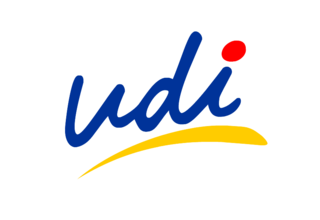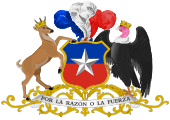
Eduardo Alfredo Juan Bernardo Frei Ruiz–Tagle is a Chilean politician and civil engineer who served as president of Chile from 1994 to 2000. He was also a Senator, fulfilling the role of President of the Senate from 2006 to 2008. He attempted a comeback as the candidate of the ruling Concertación coalition for the 2009 presidential election, but was narrowly defeated. His father was Eduardo Frei Montalva, president of Chile from 1964 to 1970.

The Christian Democratic Party is a Christian democratic political party in Chile. There have been three Christian Democrat presidents in the past, Eduardo Frei Ruiz-Tagle, Patricio Aylwin, and Eduardo Frei Montalva.

The Socialist Party of Chile is a centre-left political party founded in 1933. Its historic leader was President of Chile Salvador Allende, who was deposed in a coup d'état by General Augusto Pinochet in 1973. The military junta immediately banned socialist, Marxist and other leftist political parties. Members of the Socialist party and other leftists were subject to violent suppression, including torture and murder, under the Pinochet dictatorship, and many went into exile. Twenty-seven years after the 1973 coup, Ricardo Lagos Escobar won the Presidency as the Socialist Party candidate in the 1999–2000 Chilean presidential election. Socialist Michelle Bachelet won the 2005–06 Chilean presidential election. She was the first female president of Chile and was succeeded by Sebastián Piñera in 2010. In the 2013 Chilean general election, she was again elected president, leaving office in 2018.

The Independent Democratic Union is a conservative and right-wing political party in Chile, founded in 1983. Its founder was the lawyer, politician and law professor Jaime Guzmán, a civilian allied with Augusto Pinochet. Guzmán was a senator from 1990 until his murder by communist guerrillas on April 1, 1991.

The Concertación, officially the Concertación de Partidos por la Democracia, was a coalition of center-left political parties in Chile, founded in 1988. Presidential candidates under its banner won every election from when military rule ended in 1990 until the conservative candidate Sebastián Piñera won the Chilean presidential election in 2010. In 2013 it was replaced by New Majority coalition.

General elections were held in Chile on Sunday, 11 December 2005 to elect the president and members of the National Congress. None of the four presidential candidates received an absolute majority, leading to a runoff election between the top two candidates — Michelle Bachelet from the Coalition of Parties for Democracy and Sebastián Piñera from National Renewal — on Sunday, 15 January 2006. Bachelet was victorious with 53.49% of the vote. She succeeded President Ricardo Lagos on 11 March 2006, for a period of four years, after Congress reformed the Constitution in September 2005 and reduced the term from six years.

María Soledad Alvear Valenzuela, is a Chilean lawyer and former Christian Democrat politician, who was a cabinet member of the Aylwin, Frei and Lagos administrations. She was president of the Christian Democrat Party (PDC) from 2006–2008. She is currently senator for Santiago/East.

General elections were held in Chile on 11 December 1993 to elect the President, members of the Chamber of Deputies and elected members of the Senate. Eduardo Frei Ruiz-Tagle of the Concertación alliance was elected President, and the alliance also won a majority of seats in the Chamber of Deputies and maintained its majority in the Senate. As of 2024, this is the most recent presidential election that did not result in a runoff.

National Renewal is a liberal conservative political party in Chile. It is a member of Chile Vamos, a center-right to right-wing coalition. Sebastián Piñera, the former President of Chile, is a member of the party.

The Union of the Centrist Center — named Progressive Union of the Centrist Center between 1994 and 1998 — was a small political party in Chile.

General elections were held in Chile on Sunday 13 December 2009 to elect the president, all 120 members of the Chamber of Deputies and 18 of the 38 members of the Senate were up for election. As no presidential candidate received a majority of the vote, a second round was held between the top two candidates—Sebastián Piñera and Eduardo Frei Ruiz-Tagle—on Sunday 17 January 2010. Piñera won the runoff with 52% of the vote and succeeded Michelle Bachelet on 11 March 2010.

Ricardo Froilán Lagos Escobar is a Chilean lawyer, economist and social-democratic politician who served as president of Chile from 2000 to 2006. During the 1980s he was a well-known opponent of the Chilean military dictatorship and astounded contemporaries in 1988 by openly denouncing dictator Augusto Pinochet on live television. He served as Minister of Education from 1990 to 1992 and Minister of Public Works from 1994 to 1998 under president Eduardo Frei Ruiz-Tagle before narrowly winning the 1999-2000 presidential election in a runoff against Independent Democrat Union (UDI) candidate Joaquín Lavín. Lagos was the third president from the center-left Coalition of Parties for Democracy to have governed Chile since 1990. He was succeeded on 11 March 2006 by Socialist Michelle Bachelet, from the same coalition. From 2007 to 2010 he served as a Special Envoy on Climate Change for the United Nations Secretary-General Ban Ki-moon. Lagos made an unsuccessful bid to run for president in the 2017 Chilean general election.

José Andrés Rafael Zaldívar Larraín, popularly known as El Chico Zaldívar, is a prominent Chilean Christian Democrat politician. Andrés Zaldívar is of Basque descent.

Erwin Arturo Frei Bolívar was a Chilean politician who was a senator and presidential candidate in the 1999 election.

On 11 March 1990, Chile transitioned to a democracy, ending the military regime led by General Augusto Pinochet. This transition lasted 15 years. Unlike most democratic transitions led by either the elite or the people, this democratic transition process is known as an intermediate transition – a transition involving both the regime and the civil society. Throughout the transition, as the regime increased repressive violence, it simultaneously supported liberalization – progressively strengthening democratic institutions and gradually weakening that of the military.

Sara María Larraín Ruiz-Tagle is a Chilean politician and environmentalist who ran for president in 1999 presidential election. She is of Basque descent.

The presidential primaries of the Concertación de Partidos por la Democracia of the year 1993 was the electoral method to define the presidential candidate of such Chilean coalition, for the presidential election of 1993. In them Eduardo Frei Ruiz-Tagle, son of the ex- president Eduardo Frei Montalva and candidate for the Christian Democratic Party (PDC) faced Ricardo Lagos Escobar, candidate for the Socialist Party of Chile (PS), the Party for Democracy (PPD), the Radical Party (PR) and the Chilean Social Democracy Party.

The presidential primaries of the Concertación de Partidos por la Democracia of 1999 were the electoral system to define the presidential candidate of such Chilean coalition for the 1999 presidential election. It was an innovation of the conglomerate when nominating for the first time its candidate through a primary direct and binding election, unlike the primary of 1993.

The presidential primaries of the Concertación de Partidos por la Democracia of 2009 were the method of election of the presidential candidate of such a Chilean coalition for the 2009 presidential election. Eduardo Frei Ruiz-Tagle, former President of Chile (1994–2000), a member of the Christian Democrat Party (PDC) and candidate for his party, the Socialist Party of Chile (PS) and the Party for Democracy (PPD), and José Antonio Gómez, a militant and candidate of the Radical Social Democratic Party.

Ricardo Alejandro Solari Saavedra is a Chilean economist and politician who served as leader during the governments of Patricio Aylwin (1990−1994), Ricardo Lagos (2000–2006) and Michelle Bachelet (2014−2018).






















